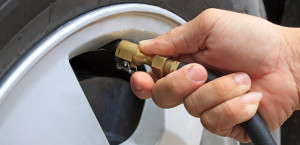The change of season means swapping the winter tires for summer tires. This is also a good time to check tire pressure for optimum fuel economy and vehicle performance. I went to Kal-Tire to get share some of their tire pressure tips for Zarowny Motors friends. Here is what they have to say:
“We hear from a lot of drivers who ask if they should be inflating their tires according to the maximum PSI (pounds per square inch) listed on the sidewall. However, when it comes to the right tire pressure, the maximum is not the optimum.
For smooth, safe rides and long-lasting tires, it’s important to find the right tire pressure for your vehicle.
THE MAXIMUM
Somewhere on the sidewall of your tire, just below the big, bold letters of the manufacturer, for example, you might have noticed the words ‘Max. Press. 35 PSI.’ That number tells you the maximum cold pressure needed for your tire to carry its maximum load.
We mention ‘cold’ pressure because that means you’re filling up your tires at the ideal time—when they’re cold. First thing in the morning or after sitting for a few hours in the shade is best.
Usually, your tire’s maximum tire pressure is somewhere between 30 and 32 PSI.
What happens if you inflate your tires to the max PSI?
- The handling characteristics change
Since tires inflated to the max can’t give as much on the sidewall, you might see superior cornering, but it could be at the risk of your braking threshold. One quick corner and your back end could slide out. - The life of your tire decreases. When your tires are inflated too much, the rubber rounds out at the top of the tire when you’re driving, and the center will quickly wear out. You’ll also reduce your traction and you could even cause a blowout.
So, what’s the right tire pressure for your vehicle?
THE OPTIMUM
You’ll find the manufacturer’s optimum or recommended tire pressure for your car on a sticker in the door jam, or in your owner’s manual. Some models even place the stickers on the trunk lid, in the console or on the fuel door.
Recommended pressure is usually between 30 and 35 PSI. That number indicates the minimum amount of air pressure needed to support your vehicle’s maximum load-carrying capacity. Any less, and you’ll see poor fuel economy and handling as well as premature wear from too much flexing and tire overloading.
When your tires are inflated to the recommended PSI, you enjoy their optimum life and performance.
INFLATING YOUR TIRES
When’s the best time to check your tire pressure? A few good rules of thumb are: every time you fill up for gas, every 10 degree change in temperature, or every 30 days.

